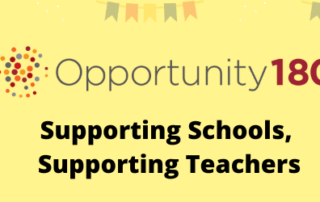What We’re Saying
Blog | Tag: Teacher recruitment
Supporting Schools, Supporting Teachers:
New Grant Program Invests in Great Ideas for High-Quality Teacher Retention and Recruitment As part of our North Star – ensuring every kid graduates from high school college and career-ready – Opportunity 180 invests in great schools and educators providing ...Continue Reading
Search
Category
Blog (36)
Clark County School District Board of Trustees (65)
Ed Watch (187)
Nevada Legislature (1)
Nevada State Board of Education (28)
North Star News (15)
State Public Charter School Authority (32)
Washoe County School District (60)
Tags
2023 Legislature
2024 Primary Election
2025 Legislature
academic performance framework
audit advisory committee
Board policies
Budget
Budget Process
Building and facilities
Capital Improvement Plan
CCSD
Cell Phone Policy
Charter Schools
chronic absenteeism
Compliance Monitor
Facilities Modernization
financial performance framework
graduation rates
Interim Superintendent
legislative session
Legislative Update
magnet schools
MAP Assessment Data
Nevada Facilities Fund
nspf
NSPF data
organizational performance framework
Public hearings
Read by 3
sbac
School closures
school safety
School Start Times
School Updates
SPCSA
Star Ratings
Start Times
stip
Strategic Plan
Strategic Planning
student discipline
Student safety
Superintendent Search
Teachers Health Trust
transportation
